Providing an exceptional e-commerce experience for your B2B clients requires careful planning and execution. To tap into the lucrative e-commerce market valued at over $6.7 trillion, it’s imperative to glean insights from successful businesses in the field.
Warren Buffett’s renowned adage, “It’s good to learn from your mistakes. It’s better to learn from other people’s mistakes,” underscores the importance of leveraging the experiences and lessons of others in the industry. By observing the strategies and practices of thriving e-commerce enterprises, you can glean valuable insights to enhance your own B2B e-commerce endeavors.
Why B2B Commerce Helps:
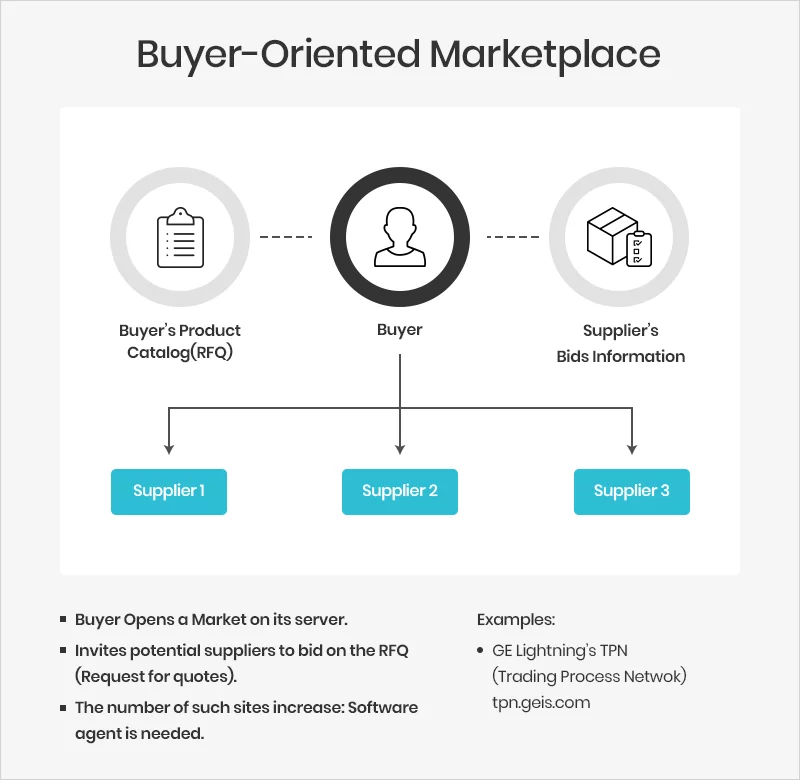
B2B eCommerce plays a crucial role in modern business landscapes for several reasons:
- Scalability: A robust B2B eCommerce platform enables businesses to expand and adapt to evolving market demands and customer expectations. By leveraging digital channels, businesses can create new sales channels and target diverse market segments more effectively, facilitating growth and scalability.
- Enhanced efficiencies: Integration with ERP and other backend systems streamlines business operations and enhances efficiency for B2B organizations. Online ordering capabilities reduce the need for manual data entry, allowing customer service teams to focus on value-added tasks rather than order processing. This integration minimizes errors, optimizes shipping processes, and increases order throughput, resulting in improved operational efficiency.
- Access to a broader customer base: B2B eCommerce platforms with public-facing catalog pages enable businesses to reach new customers and expand their market reach. With more B2B buyers turning to online channels to research products and services, manufacturers and distributors can leverage search engine visibility to attract and convert new prospects into customers, thereby expanding their customer base.
- Increased sales: eCommerce platforms empower businesses to implement automated cross-selling and upselling strategies, providing customers with relevant product recommendations and encouraging them to make additional purchases. By leveraging data analytics and personalized recommendations, businesses can enhance the customer shopping experience and drive incremental sales.
- Improved customer service: B2B eCommerce platforms offer opportunities for businesses to elevate their customer service initiatives. Self-service portals allow customers to access order history, track shipments, and manage their accounts independently, improving convenience and efficiency. Moreover, personalized pricing, product catalogs, and service offerings tailored to individual customer profiles enhance the overall customer experience and foster long-term loyalty.
Learn about the power of social listening in B2B here.
Successful Companies of B2B Success:
1. MedUX

In the B2B customer experience, prioritizing customer-centricity reigns supreme. This entails aligning your business channels with the specific needs and preferences of your customers. By adopting an omnichannel strategy, you can seamlessly integrate various sales channels to deliver a cohesive and personalized purchasing journey.
MedUX exemplifies the successful implementation of an omnichannel strategy within the B2B sphere. Serving as an umbrella company for a diverse portfolio of brands and entities, MedUX offers healthcare and wellness resources through multiple online platforms. Through seamless integration between its systems and the Sana Commerce web store and Microsoft Dynamics NAV (Navision) ERP, MedUX has achieved significant milestones, including:
- Establishing a unified e-commerce platform
- Enhancing shipping and return processes
- Gaining real-time visibility into inventory levels
- Prioritizing customer-centricity
At the core of MedUX’s business philosophy lies a deep commitment to meeting consumer needs and expectations. This commitment is manifested in the user-friendly design of its web store, allowing customers to dictate their preferred purchasing methods, whether online or in-store.
2. Alibaba
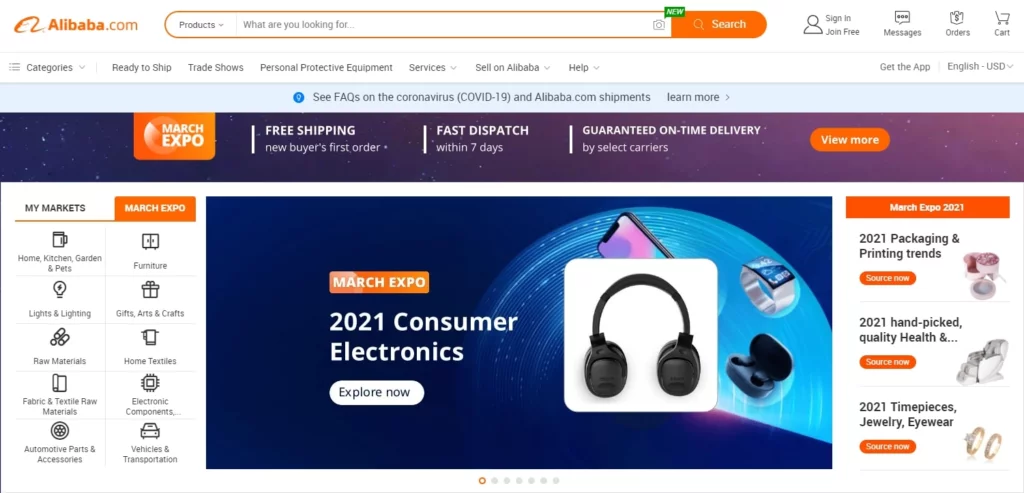
As one of the world’s largest B2B e-commerce conglomerates, Alibaba has carved a prominent niche for itself in over 240 countries and territories, serving a vast network of 18+ million sellers and buyers across 40 industries.
The linchpin of Alibaba’s success lies in its unwavering commitment to innovation from its inception. By fostering a symbiotic ecosystem between Chinese manufacturers and the global marketplace, Alibaba has continuously evolved and expanded its reach.
A key driver of Alibaba’s growth trajectory has been its keen focus on addressing customer needs and preferences. By seamlessly connecting sellers with buyers and monetizing transactions through commissions and advertisements, Alibaba has created a dynamic marketplace that thrives on customer-centricity and adaptability.
3. Amazon

Amazon stands as a global powerhouse, akin to Alibaba, revered by consumers across numerous countries. In addition to its consumer-centric e-commerce arm, Amazon Business has emerged as a frontrunner in the realm of B2B e-commerce, boasting a staggering $16 billion in sales in 2020.
Distinguished by its comprehensive suite of offerings, Amazon Business provides a holistic package tailored to the needs of B2B enterprises. This includes robust features such as approval workflows, invoice-based payments, and multi-user accounts. Furthermore, customers can opt for Business Prime subscriptions offering various tiers, each unlocking a plethora of exclusive benefits. Amazon Business continuously innovates, regularly introducing new features and refining the user experience to meet evolving demands.
4. Royal Brinkman
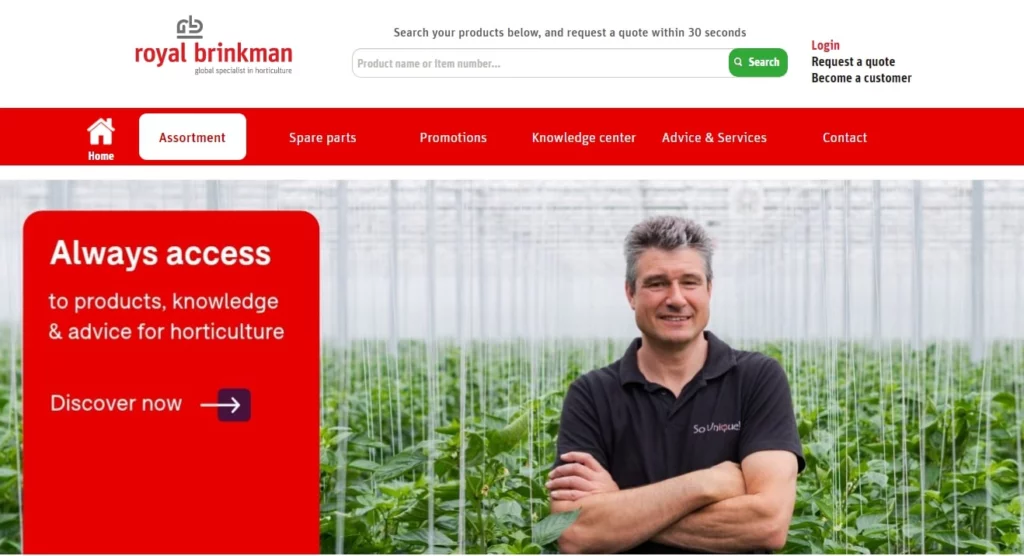
Personalization has become the cornerstone of B2B e-commerce, with a significant proportion of B2B shoppers expecting a level of service akin to their experiences on platforms like Amazon. Failure to deliver a personalized experience can result in customers swiftly seeking alternatives.
Royal Brinkman serves as a prime example of effective personalization within B2B e-commerce, leveraging its extensive database of customer insights to segment its audience into distinct groups. By employing customer segmentation, Royal Brinkman tailors its content to resonate with the diverse needs and preferences of its B2B clientele. Through its intuitive web store, the company delivers targeted content, including informative videos, designed to address the specific queries and challenges faced by different customer segments.
For instance, content geared towards a flower farmer will differ from that aimed at a potato farmer, with the overarching goal of guiding customers towards informed purchasing decisions aligned with their unique requirements.
5. eWorldTrade
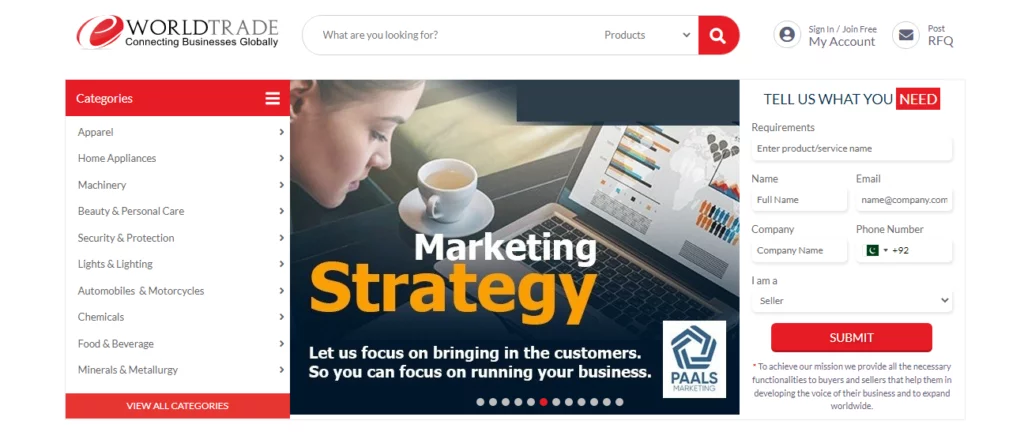
In the virtual marketplaces, eWorldTrade has emerged as a standout platform, facilitating connections between millions of buyers and sellers worldwide. Central to its appeal is its unique selling proposition (USP), which offers sellers access to a comprehensive database of potential customers, sparing them the hassle of prospecting and outreach.
Furthermore, eWorldTrade places a premium on buyer security and satisfaction, implementing stringent policies aimed at minimizing the risk of fraud and errors. Through its thoughtfully devised strategies, eWorldTrade strives to cultivate a trustworthy and conducive environment for B2B transactions, ensuring a seamless and secure experience for all parties involved.
6. EcoEnclose

EcoEnclose stands out as a provider of environmentally friendly packaging solutions, catering to a wide array of business needs while aligning with customers’ sustainability values. With a keen focus on customer-centricity, EcoEnclose ensures a seamless B2B experience while also accommodating those customers who prefer a B2C-like shopping journey.
The platform endeavors to replicate a B2C experience by offering clear product segmentation, intuitive navigation, high-quality product imagery, and detailed product specifications. Customers have the flexibility to make bulk purchases without logging in or opt for an account, facilitating faster checkout and providing access to features such as saved shipping destinations, order history, order tracking, and wishlist functionality.
Moreover, EcoEnclose goes the extra mile to assist customers in selecting the right packaging solutions by providing comprehensive information for each item. Detailed spec sheets outline product features, dimensions, and technical specifications, while also indicating whether the packaging materials are recycled, recyclable, or biodegradable.
7. Mallory Safety & Supply
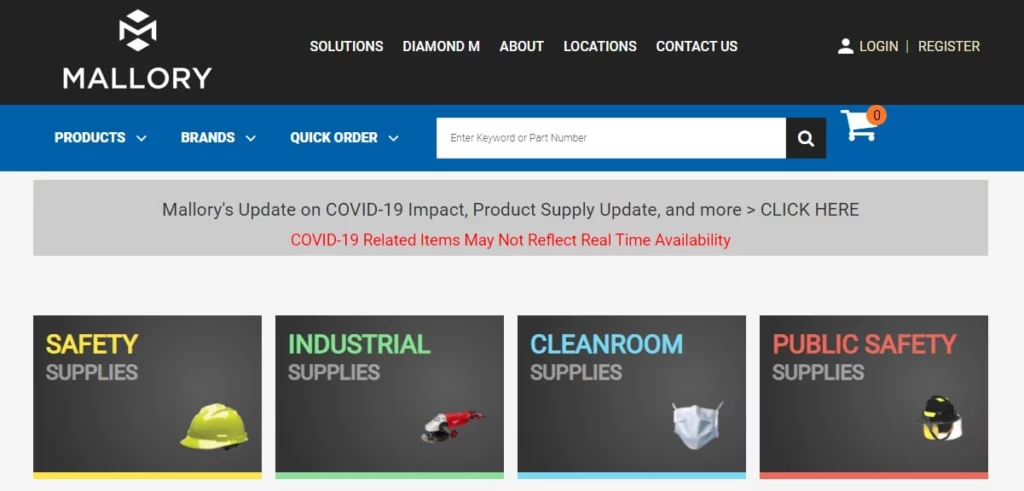
Mallory Safety & Supply distinguishes itself with its meticulously designed B2B e-commerce storefront, offering a seamless shopping experience characterized by several standout features.
The website excels in grouping similar items under expandable views, streamlining the browsing experience for customers. For instance, product variants such as safety vests in different sizes are consolidated under a single listing, enhancing clarity and convenience. Additionally, Mallory’s website maintains a “sticky” search bar and shopping cart icon at the top of the navigation, ensuring easy access for users as they navigate the site.
Notably, Mallory facilitates product customization by integrating with Custom Safety Products, allowing buyers to personalize their orders with unique logos. This feature enhances the shopping experience and adds a layer of personalization, contributing to customer satisfaction and loyalty.
8. Atlanta Light Bulbs
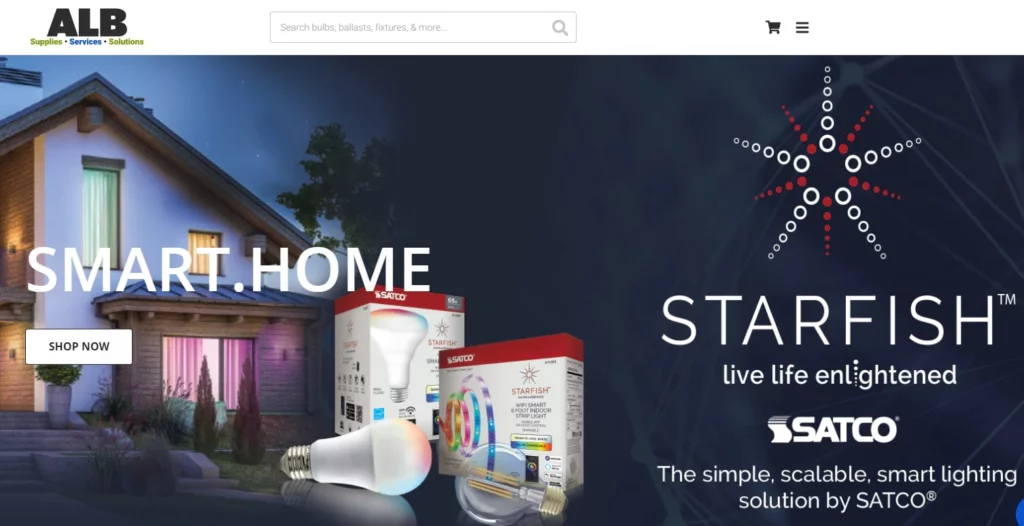
Atlanta Light Bulbs, with over two decades of experience, recently revamped its e-commerce operations to drive revenue growth and enhance the customer experience. The platform boasts an array of features aimed at empowering B2B buyers and optimizing their purchasing journey.
A robust faceted search functionality enables customers to filter product results based on various criteria such as price, brand, bulb type, and wattage, streamlining the product discovery process. Additionally, the integration of Google Customer Reviews provides transparency and social proof, enhancing trust and confidence among buyers.
Atlanta Light Bulbs further enhances the purchasing experience with the introduction of a mobile app, enabling faster order placement, and facilitating custom quotes through another app. Customers can also leverage personalized pricing options and loyalty programs, catering to their individual needs and preferences.
9. Kippie
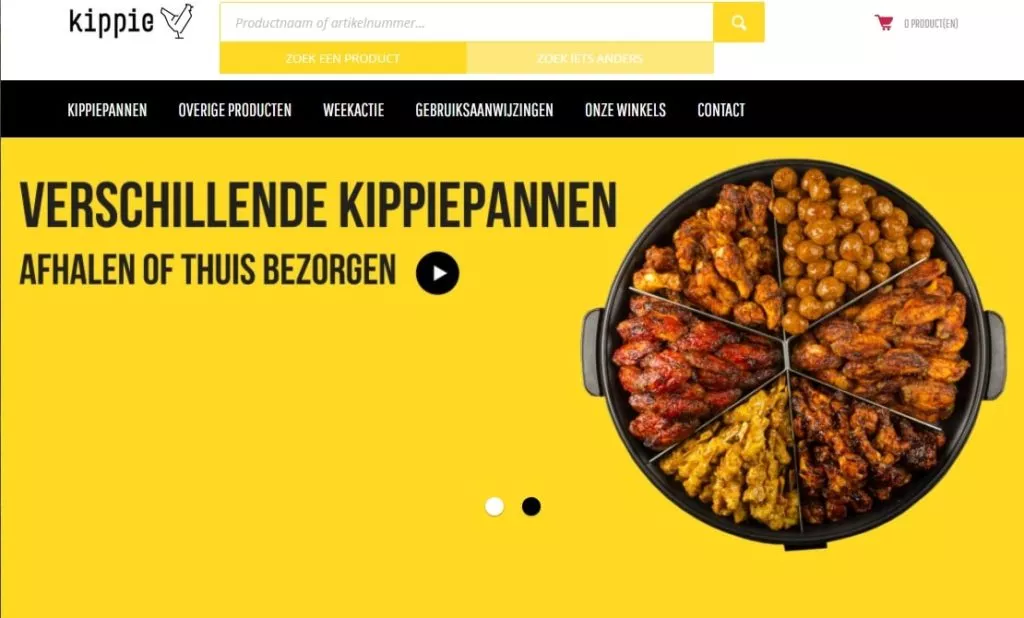
Acknowledging the growing preference for a B2C-like shopping experience among B2B customers, Kippie prioritizes convenience by offering a guest checkout option. Recognizing that customers may prefer expedited purchases without the need for lengthy form-filling, Kippie ensures a frictionless shopping experience.
With the “one-time guest checkout” feature, customers have the flexibility to complete their purchases without the hassle of creating an account or entering extensive personal information. This streamlined checkout process mirrors the convenience of B2C transactions, catering to the evolving expectations of B2B buyers and mitigating cart abandonment rates.
10. Berlin Packaging
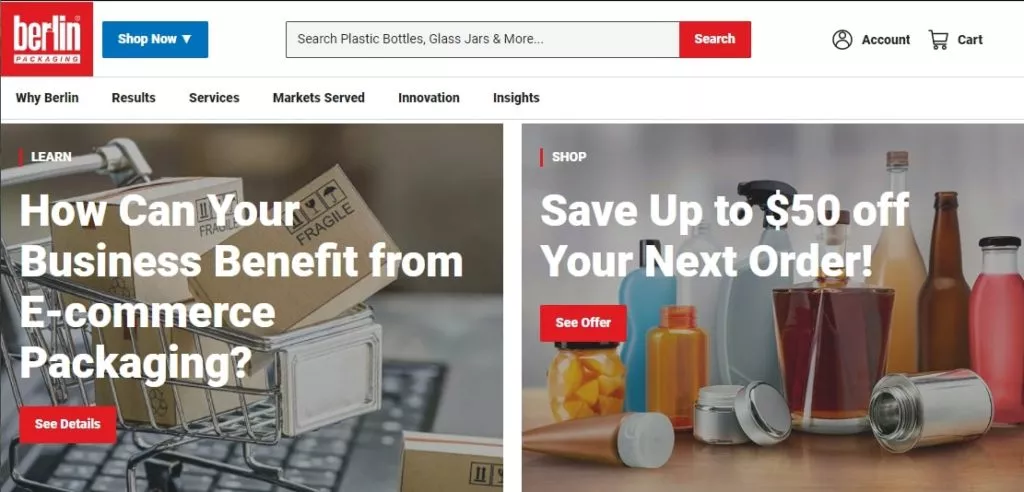
Berlin Packaging, an international supplier of containers and packaging, embarked on enhancing its e-commerce platform to deliver a top-tier customer experience. Central to this endeavor was the creation of an intuitive and user-friendly interface tailored to meet the needs of B2B customers.
The revamped website features high-resolution product images and comprehensive product information, facilitating informed purchasing decisions. To streamline product discovery, the site offers robust navigation tools, allowing buyers to filter through the extensive product catalog with ease. Parameters such as color, shape, material type, capacity, and function enable buyers to narrow down their search effectively.
Integration of the company’s ERP system with the e-commerce platform has been pivotal in enhancing operational efficiency. This integration ensures seamless synchronization of inventory, orders, and customer data, enabling swift and accurate order processing. Additionally, Berlin Packaging’s customer support capabilities are bolstered by the ability to swiftly retrieve customer records, including order history and credit limits, based on purchase orders.
In line with B2B customer preferences, the website delivers a B2C-like shopping experience, complete with customer feedback mechanisms, personalized recommendations, and live chat support. Exclusive B2B features, such as credit application and quote generation, further cater to the unique requirements of business buyers.
11. The Smartwares Group

The Smartwares Group, a supplier of small household items, has carved a niche for itself with a dedicated spare parts portal, catering to both B2B and B2C customers across its portfolio of brands. With eight distinct web stores serving as distribution channels, the group has streamlined the procurement process for retailers and end-users alike.
Customers seeking spare parts benefit from a separate portal within the web store, offering a comprehensive inventory of spare parts for each product category. The portal provides detailed product information and facilitates comparison shopping, minimizing the likelihood of incorrect orders and subsequent returns. Moreover, the implementation of return merchandise agreements (RMA) simplifies order adjustments, ensuring seamless logistics management.
Conclusion:
While nothing can replace firsthand experience, studying successful B2B eCommerce examples can undoubtedly provide valuable insights and guidance for aspiring entrepreneurs. By learning from the successes and strategies of established players in the industry, you can make more informed decisions and navigate the complexities of launching and growing your eCommerce business with greater confidence and efficiency.
Have any of the aforementioned B2B eCommerce examples sparked inspiration for your own endeavors, or do you have a compelling story of your own to share? We invite you to share your thoughts and experiences in the comments section below. Your contributions not only enrich the conversation but also offer valuable perspectives for fellow readers and aspiring entrepreneurs alike.
FAQs on B2B Ecommerce:
How can studying B2B eCommerce examples benefit aspiring entrepreneurs?
Studying successful B2B eCommerce examples provides valuable insights into effective strategies, best practices, and potential pitfalls in the industry. By analyzing real-world cases, aspiring entrepreneurs can gain practical knowledge and inspiration to inform their own business decisions and maximize their chances of success.
Are there any specific lessons that can be learned from B2B eCommerce examples?
Yes, B2B eCommerce examples offer a wealth of lessons across various aspects of business operations, including customer experience, marketing strategies, technology integration, and customer engagement. By studying these examples, entrepreneurs can glean insights into what works well in the B2B eCommerce landscape and apply these lessons to their own ventures.
How can entrepreneurs apply lessons learned from B2B eCommerce examples to their own businesses?
Entrepreneurs can apply lessons learned from B2B eCommerce examples by identifying key success factors, such as customer-centricity, efficient logistics, personalized experiences, and innovative technologies, and incorporating these principles into their own business strategies. Additionally, entrepreneurs can adapt and iterate on existing models to suit their unique business goals and target market.



